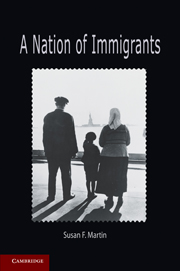Book contents
- Frontmatter
- Contents
- Acknowledgments
- 1 Introduction
- 2 “Gentlemen, Tradesmen, Serving-men, Libertines”
- 3 “A City upon a Hill”
- 4 “The Seed of a Nation”
- 5 Immigration and the Formation of the Republic
- 6 Building a Nation: 1830–1880
- 7 The Golden Door: 1880–1917
- 8 The Triumph of Restrictionism: 1882–1924
- 9 Turning Inward: 1924–1964
- 10 “A Nation of Immigrants”: 1965–1994
- 11 A Nation of Refuge
- 12 The Pennsylvania Model at Risk: 1993–2009
- 13 Looking Ahead
- References
- Index
2 - “Gentlemen, Tradesmen, Serving-men, Libertines”
Published online by Cambridge University Press: 05 June 2012
- Frontmatter
- Contents
- Acknowledgments
- 1 Introduction
- 2 “Gentlemen, Tradesmen, Serving-men, Libertines”
- 3 “A City upon a Hill”
- 4 “The Seed of a Nation”
- 5 Immigration and the Formation of the Republic
- 6 Building a Nation: 1830–1880
- 7 The Golden Door: 1880–1917
- 8 The Triumph of Restrictionism: 1882–1924
- 9 Turning Inward: 1924–1964
- 10 “A Nation of Immigrants”: 1965–1994
- 11 A Nation of Refuge
- 12 The Pennsylvania Model at Risk: 1993–2009
- 13 Looking Ahead
- References
- Index
Summary
The title of this chapter comes from a passage in John Smith's General History of Virginia in which he rues the paucity of laborers among the early colonizers in Jamestown. The expense of migrating, as well as the conditions found in the colony, restricted movements to the colonies. Within a few decades, as the tobacco economy developed, Virginia had identified several sources of foreign labor. The first was indentured servants. The employer paid the migrant's passage in exchange for indented labor, which was usually for a term of from four to seven years. On release from the indenture, the worker was to be provided with tools, clothing, and land or other means of self-support, although these terms were by no means always upheld. There were prominent cases in which released servants experienced upward mobility, including landownership and political participation; but in many cases, the freed worker remained dependent on the former employer for continued employment.
The second category of “labor migrant” was composed of convicts and debtors. The governor of Virginia sought the transfer to the colony of convicts who had been condemned to death in England. Orphans were also sent to the colony, with girls particularly valuable as “breeders” because so few Virginia colonists were female. In the most celebrated case, Georgia's charter promoted the immigration of debtors and convicts who would be able to redeem themselves in the new colony while forming a barrier between the more populous British colonies and the Spanish in Florida.
- Type
- Chapter
- Information
- A Nation of Immigrants , pp. 11 - 26Publisher: Cambridge University PressPrint publication year: 2010



